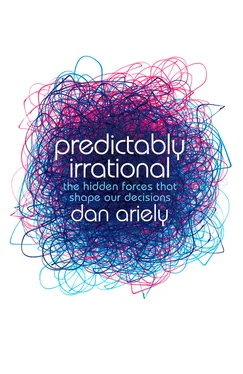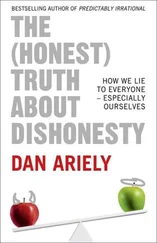OK for bread makers. But let's take a look at the decoy effect in a completely different situation. What if you are single, and hope to appeal to as many attractive potential dating partners as possible at an upcoming singles event? My advice would be to bring a friend who has your basic physical characteristics (similar coloring, body type, facial features), but is slightly less attractive (—you).
Why? Because the folks you want to attract will have a hard time evaluating you with no comparables around. However, if you are compared with a “—you,” the decoy friend will do a lot to make you look better, not just in comparison with the decoy but also in general, and in comparison with all the other people around. It may sound irrational (and I can't guarantee this), but the chances are good that you will get some extra attention. Of course, don't just stop at looks. If great conversation will win the day, be sure to pick a friend for the singles event who can't match your smooth delivery and rapier wit. By comparison, you'll sound great.
Now that you know this secret, be careful: when a similar but better-looking friend of the same sex asks you to accompany him or her for a night out, you might wonder whether you have been invited along for your company or merely as a decoy.
RELATIVITY HELPS US make decisions in life. But it can also make us downright miserable. Why? Because jealousy and envy spring from comparing our lot in life with that of others.
It was for good reason, after all, that the Ten Commandments admonished, “Neither shall you desire your neighbor's house nor field, or male or female slave, or donkey or anything that belongs to your neighbor.” This might just be the toughest commandment to follow, considering that by our very nature we are wired to compare.
Modern life makes this weakness even more pronounced. A few years ago, for instance, I met with one of the top executives of one of the big investment companies. Over the course of our conversation he mentioned that one of his employees had recently come to him to complain about his salary.
“How long have you been with the firm?” the executive asked the young man.
“Three years. I came straight from college,” was the answer.
“And when you joined us, how much did you expect to be making in three years?”
“I was hoping to be making about a hundred thousand.”
The executive eyed him curiously.
“And now you are making almost three hundred thousand, so how can you possibly complain?” he asked.
“Well,” the young man stammered, “it's just that a couple of the guys at the desks next to me, they're not any better than I am, and they are making three hundred ten.”
The executive shook his head.
An ironic aspect of this story is that in 1993, federal securities regulators forced companies, for the first time, to reveal details about the pay and perks of their top executives. The idea was that once pay was in the open, boards would be reluctant to give executives outrageous salaries and benefits. This, it was hoped, would stop the rise in executive compensation, which neither regulation, legislation, nor shareholder pressure had been able to stop. And indeed, it needed to stop: in 1976 the average CEO was paid 36 times as much as the average worker. By 1993, the average CEO was paid 131 times as much.
But guess what happened. Once salaries became public information, the media regularly ran special stories ranking CEOs by pay. Rather than suppressing the executive perks, the publicity had CEOs in America comparing their pay with that of everyone else. In response, executives' salaries skyrocketed. The trend was further “helped” by compensation consulting firms (scathingly dubbed “Ratchet, Ratchet, and Bingo” by the investor Warren Buffett) that advised their CEO clients to demand outrageous raises. The result? Now the average CEO makes about 369 times as much as the average worker – about three times the salary before executive compensation went public.
Keeping that in mind, I had a few questions for the executive I met with.
“What would happen,” I ventured, “if the information in your salary database became known throughout the company?”
The executive looked at me with alarm. “We could get over a lot of things here – insider trading, financial scandals, and the like – but if everyone knew everyone else's salary, it would be a true catastrophe. All but the highest-paid individual would feel underpaid – and I wouldn't be surprised if they went out and looked for another job.”
Isn't this odd? It has been shown repeatedly that the link between amount of salary and happiness is not as strong as one would expect it to be (in fact, it is rather weak). Studies even find that countries with the “happiest” people are not among those with the highest personal income. Yet we keep pushing toward a higher salary. Much of that can be blamed on sheer envy. As H. L. Mencken, the twentieth-century journalist, satirist, social critic, cynic, and freethinker noted, a man's satisfaction with his salary depends on (are you ready for this?) whether he makes more than his wife's sister's husband. Why the wife's sister's husband? Because (and I have a feeling that Mencken's wife kept him fully informed of her sister's husband's salary) this is a comparison that is salient and readily available. {2} 2 Now that you know this fact, and assuming that you are not married, take this into account when you search for a soul mate. Look for someone whose sibling is married to a productivity-challenged individual.
All this extravagance in CEOs' pay has had a damaging effect on society. Instead of causing shame, every new outrage in compensation encourages other CEOs to demand even more. “In the Web World,” according to a headline in the New York Times , the “Rich Now Envy the Superrich.”
In another news story, a physician explained that he had graduated from Harvard with the dream of someday receiving a Nobel Prize for cancer research. This was his goal. This was his dream. But a few years later, he realized that several of his colleagues were making more as medical investment advisers at Wall Street firms than he was making in medicine. He had previously been happy with his income, but hearing of his friends' yachts and vacation homes, he suddenly felt very poor. So he took another route with his career – the route of Wall Street. [3] Louis Uchitelle, “Lure of Great Wealth Affects Career Choices,” New York Times (November 27, 2006).
By the time he arrived at his twentieth class reunion, he was making 10 times what most of his peers were making in medicine. You can almost see him, standing in the middle of the room at the reunion, drink in hand – a large circle of influence with smaller circles gathering around him. He had not won the Nobel Prize, but he had relinquished his dreams for a Wall Street salary, for a chance to stop feeling “poor.” Is it any wonder that family practice physicians, who make an average of $160,000 a year, are in short supply? {3} 3 Of course, physicians have other problems as well, including insurance forms, bureaucracy, and threats of lawsuits for malpractice.
CAN WE DO anything about this problem of relativity?
The good news is that we can sometimes control the “circles” around us, moving toward smaller circles that boost our relative happiness. If we are at our class reunion, and there's a “big circle” in the middle of the room with a drink in his hand, boasting of his big salary, we can consciously take several steps away and talk with someone else. If we are thinking of buying a new house, we can be selective about the open houses we go to, skipping the houses that are above our means. If we are thinking about buying a new car, we can focus on the models that we can afford, and so on.
Читать дальше












